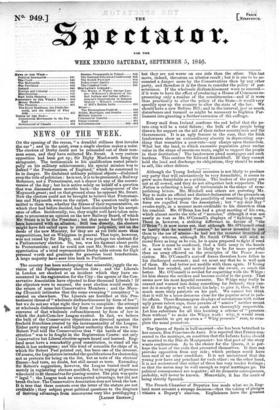Every mail from Ireland confirms the sad belief that the
po- tato crop will be a total failure; • the bulk of the people being thrown for support on the aid of their richer countrymen and the Government. It is an ugly feature in the case, that the Irish landowners show an extraordinary alacrity in deprecating any- thing that resembles a poor-rate—any charge upon themselves. What but the land, to which excessive population gives undue value in the shape of enormous rents, ought to support the people in their destitution? The landowners plead mortgages and such burdens. This outdoes Sir Edward Knatchbull. Ir they cannot hold the land and discharge its obligations, they should be made to sell, like other debtors.
Although the Young Ireland secession is not likely to produce any party that will substantively be very formidable, it seems to grow more formidable as a schism. The leaders of the party are not at all cowed, and they do not altogether lack supporters. The Nation is collecting a heap of testimonials in the shape of sym- pathizing letters. Mr. Mitchell and others are pestering Mr. Ray to make an official and distinct declaration of the grounds on which men who recognize the possibility of resorting to physical force are expelled from the Association ; but " my dear Ray " i evades reply, in a manner more creditable to his discretion than his candour. Mr. O'Brien has had a great meeting of his own, which almost merits the title of "monster," although it was not nearly so vast as Mr. O'Connell's displays of " fighting men." There is, however, a striking difference in favour of "the O'Brien ": it now turns out, that although Mr. O'Connell cried so lustily that he wanted "armies," he never intended to put them to the use of armies—he had not the remotest intention of fighting ; whereas, although Mr. Smith O'Brien will stick to moral force as low,.t' as he can, he is quite prepared to fight if need be. Now it must be confessed, that a little army in the bands of a man who will use it is likely to be far more powerful than an army officered on the principles of the Peace Asso- ciation. Mr. O'Connell's cast-off forces therefore have fallen to his discharged servants ; and we must say that he is well quit of them. He had- better not meddle with them again. If Young Ireland has seceded, and carried home the sword, so much the better. Mr. O'Connell is reviled for coquetting with the Whigs : let him shame the revilers and become wedded to the party. That seems now his most hopeful resource. The Whigs may really be coaxed and warned into doing something for Ireland ; they can- not do it nearly so well without his help ; to give it., then, will be much more truly patriotic on his part. We cannot but think that it will be a more decuruus close for the popular actor in pub- lic affairs. Those Brummagem displays of coronations with rather ugly green velvet caps, those parades of "armies" neither meant nor fit for fighting, were in sooth not thoroughly respectable. Let him substitute for all this humbug a scheme of " pressure. from without " to make the Whigs work : why, it would seem quite possible to get up even a " Whig pressure " rent, to com- plete the usual procedure.


























